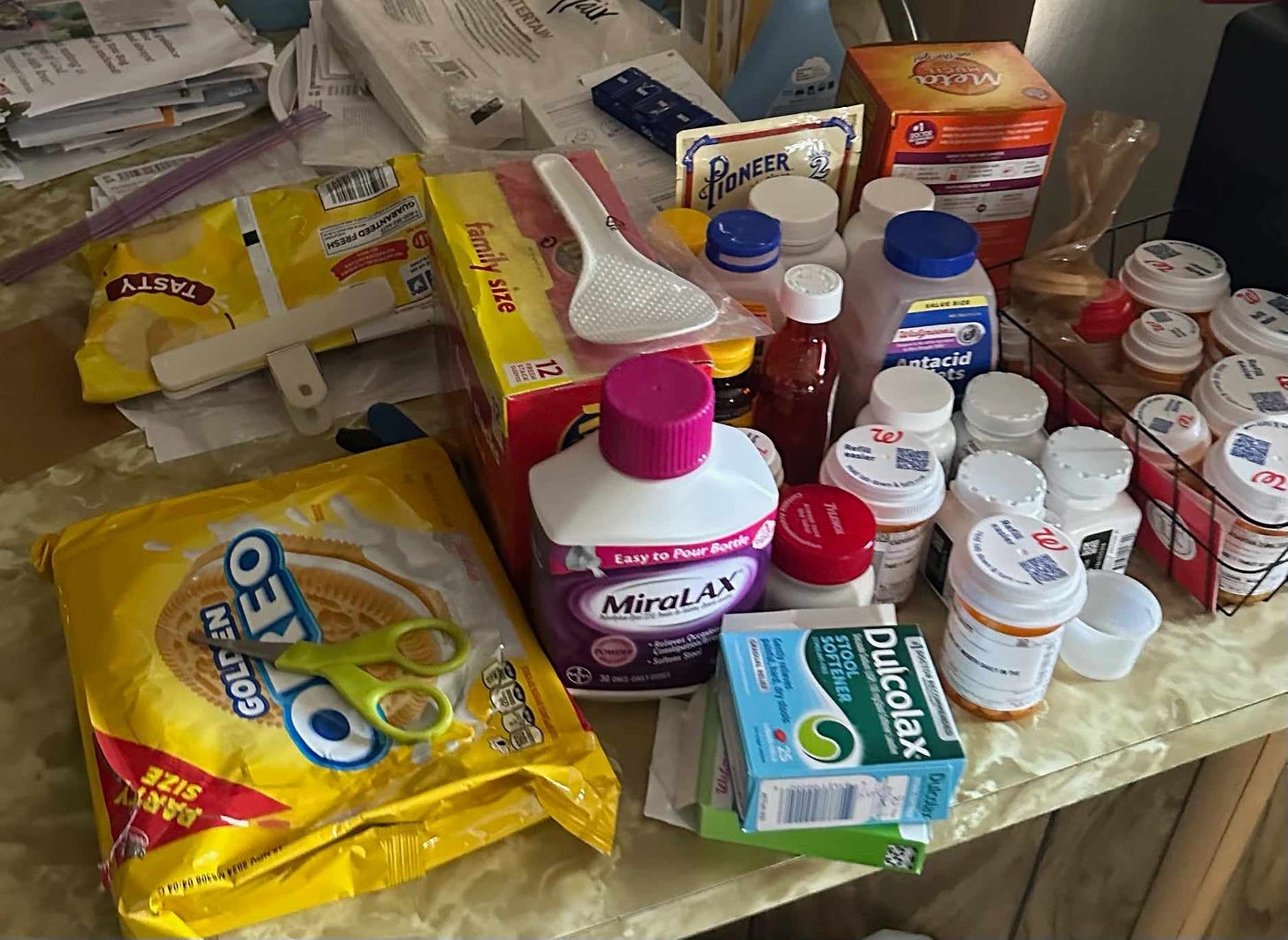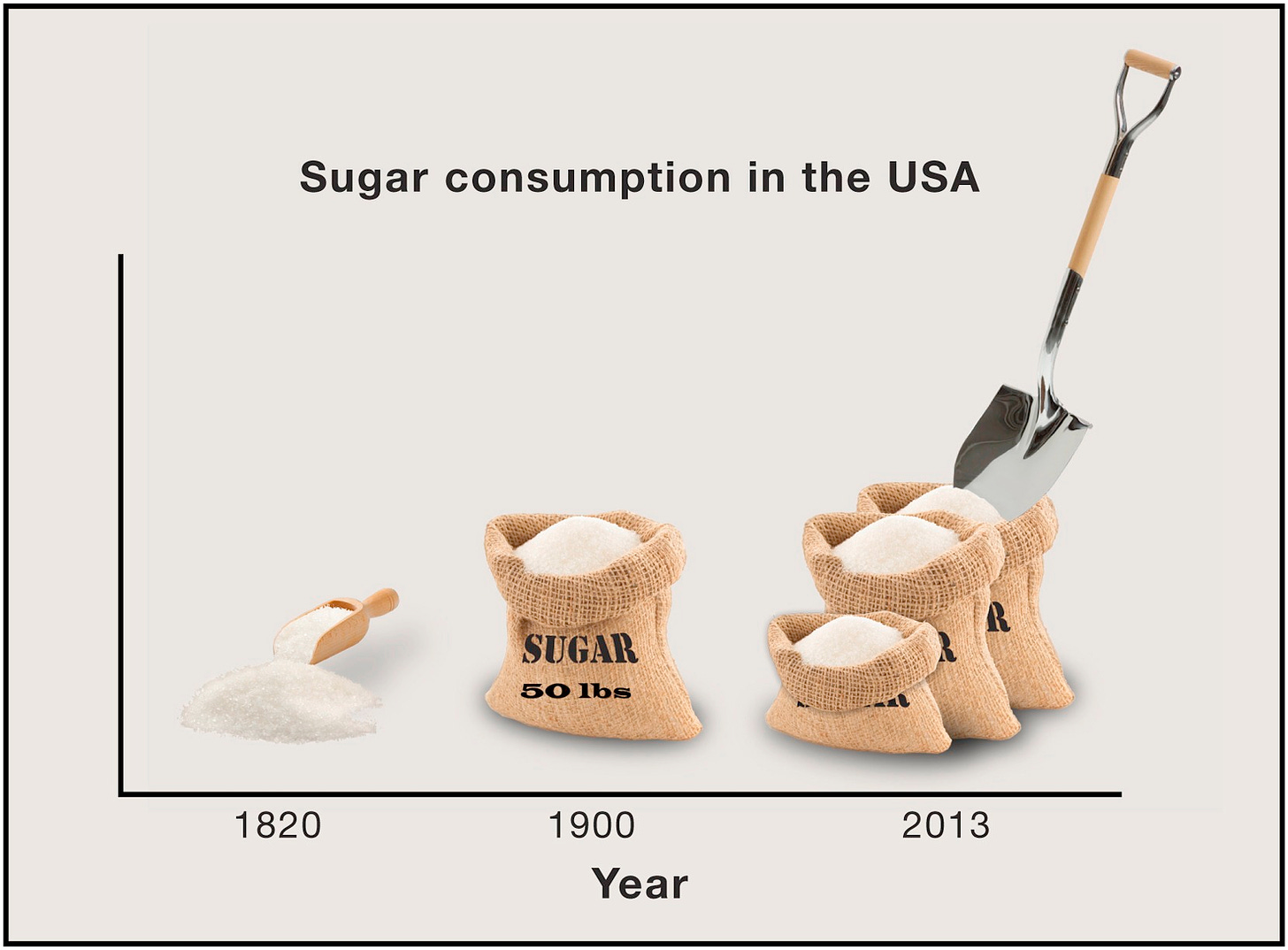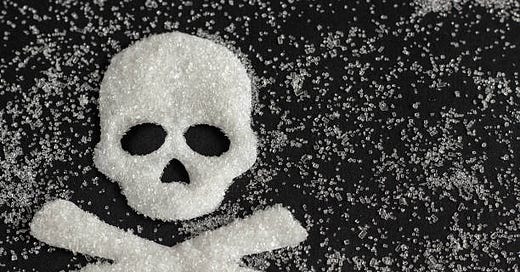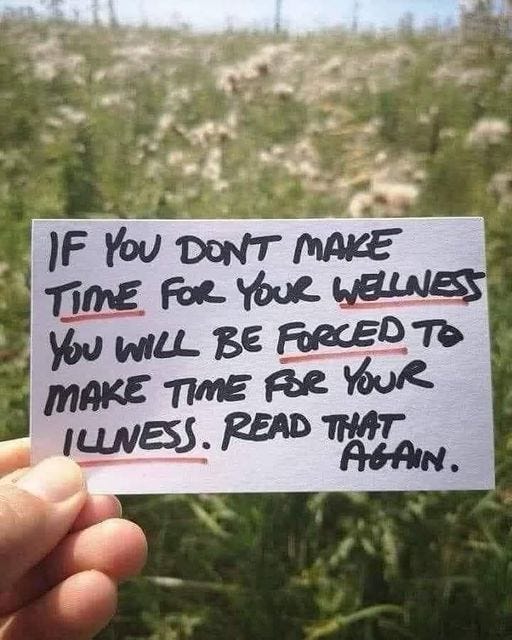Welcome to Polymathic Being, a place to explore counterintuitive insights across multiple domains. These essays take common topics and explore them from different perspectives and disciplines to uncover unique insights and solutions.
Today's topic shifts gears to focus on our physical health. The topic is sugar and how that delicious and dopamine-rewarding delicacy is like a master key that, unmanaged, unlocks an entire panoply of terrible pathologies that sour our health.
Introduction
70% of Americans are obese or overweight. 50% are diabetic or pre-diabetic. Millions more suffer health issues that may have a common key: Sugar. Today, I’m excited to introduce my cousin,
, who is not only a fitness aficionado with a body like Zeus but also a Dr. of Physical Therapy who works with the elderly to maintain their health and physical capabilities. We’re collaborating today on an idea he planted in my brain a year ago on how to think of sugar:Sugar in the blood is diabetes
Sugar in the brain is dementia
Sugar in the tissue is cancer
Sugar in the arteries is heart disease
Sugar in the nerves is neuropathy
Sugar in the eyes is blindness
It’s sobering to put sugar into context like this but the reality is even more sobering. Our love of sweets, unregulated, results in cascading consequences that compound health issues while, at the same time, becoming more and more difficult to overcome.
Sugar Death
I’m Jared. I’m a home health physical therapist and I’ve worked with the geriatric population for over 12 years. When working inside people’s homes, this has given me an intimate view into their lives, and their many chronic conditions, and I see each person’s lifestyle on full display. At this point in my career, I have seen thousands of cases, and I can typically predict who will have the most positive prognosis following a debilitating event. And it’s interesting.
The irony is that this isn’t some sophisticated medical diagnostic, it’s the types of food and drinks I see on their counters and in their fridges. The main culprit always comes down to sugar. My goal with this discussion is to help us question our relationship to an incredibly addictive substance and provide motivation for healthier behaviors.
I’ll start with an example of a patient I had. When the referral came in from the doctor, they listed the patient as “weak and de-conditioned.” She had returned from the hospital after suffering a heart attack but this did not paint the full story. Upon my arrival, my patient was lying on a bariatric hospital bed, wearing an oxygen mask with the concentrator at 6 liters per minute, which is a bit extreme. Her goal was to be able to stand and walk again to attend her friend’s wedding in four months.
Now she was 5 feet tall, weighed 530 lbs, and was only 43 years old. She told me that she always loved sweets as a child, and had always been “big” for her age. I asked what her diet was like now and she told me that her husband, to make her happy, delivers fast food daily and tops off her soda with various flavored sugar syrups. As I walked through the kitchen, I saw no real food, just a countertop full of those syrups lined in a row, and a trashcan full of fast food wrappers.
I never like giving people false hope and I also don’t like lying to them; she was nutritionally bankrupt. During the course of her treatment, I dutifully worked through her physical therapy while attempting to coach her diet and finally, after a full month, she was able to stand unassisted for almost 30 seconds. The oxygen in her blood would desaturate down to 76%, and she would sit back down on the bed out of breath and exhausted. She barely attempted her home exercise protocol when I wasn’t there and made zero effort to change her diet. The bigger problem was that the game was already over before I entered the door and sadly, she died just one month later, never making it to her friend’s wedding.
Sugar Consumption is a Debt
Let's pretend that sugar is the equivalent of a credit card. Now we can’t go through life always sticking to a boring budget, and never having any fun. That’s depressing. Sometimes we have to cut loose and book a cruise, buy that new outfit, or surprise a loved one with those concert tickets. The thing is, all of those decisions come at a cost, or in this case a debt.
With a credit card, we know it’s a debt. So we need to have a plan to pay it back, especially by the end of the month so we don’t accrue interest. Let’s think of the interest as those adverse health consequences that also compound. As I was writing this, I was ironically having a great time eating a bowl of ice cream, BUT, through my disciplined routine, the next morning I paid back that debt at the gym. By the end of the week I was debt-free again, so long as I didn’t go on another ice cream bender.
Diet is like spending, in that you can’t out-exercise a bad diet, and those credit card bills will add up quickly. For some people, the spending is out of control and much like our American diet, it’s the equivalent of 12 maxed-out credit cards, multiple delinquencies, and a credit score of 430. Some people, like the story we just heard about my patient, are past the point of no return. They’re bankrupt. And unfortunately, it’s game over.

The Truth of Sugar
Sugar is a treat. The Oxford Dictionary defines “treat” as, “an item that is out of the ordinary and gives great pleasure.” The keywords here are “out of the ordinary.” When sugar becomes an ordinary part of our daily lives it WILL be a problem eventually. Our bodies pay the price for the debt we’ve accumulated. For some, the bank forecloses on your house early in life, and for others, they manage to transfer their debt time and time again onto different credit cards, bank loans, and refinancing. But eventually, the debt catches up later in life as they have over-leveraged themselves and the house of cards falls in a cascade of health consequences.
Researchers from the University of Minnesota found that “sugary foods cause a chemical effect similar to that of addictive drugs like cocaine.” This was studied in the brains of animals, but we can clearly see a similar effect with humans.
Researchers at the University of California-San Francisco claimed “that sugar is essentially a toxin that causes all sorts of lifestyle diseases, including hypertension, heart disease, diabetes and even cancer. They proposed that sugar be regulated like tobacco and alcohol with taxes on sugary products, age limits applied to certain foods and beverages, and restrictions on advertising (especially on ads targeted to kids).”
Now I’ll repeat the list from above here again because this is important:
Diabetes: or Sugar in the blood: - The pancreas can no longer make or regulate insulin, therefore glucose remains free-floating in the blood and accumulates in other parts of the body. Sugar in the blood is also transported throughout the body unlocking more diseases.
Dementia: or Sugar in the brain: - Alzheimer’s is now being referred to as Type 3 diabetes. A study by the National Institute of Health compared older adults with sugar consumption and dementia. They found that compared to the lowest intake of total sugar, the participants with the highest intake developed Alzheimer’s dementia an average of 7.1 years earlier or twice the risk. Overall, a higher percentage of calories from sugar was associated with a higher risk of dementia.
Cancer: or Sugar in the tissues: now there are other reasons you can develop Cancer - BUT, but Diabetes, obesity, and inflammation can lead to cancer of the liver, pancreas, colorectal, endometrial, breast, and bladder.
Neuropathy: or Sugar on the nerves: - Glucose can accumulate in the extremities as the heart pumps blood to the periphery. And over time blood vessels and nerves can become damaged causing numbness and pain.
Heart disease: Sugar damaging the arteries: Consuming too much sugar can raise blood pressure and increase chronic inflammation, both of which are pathological pathways to heart disease. The higher the sugar consumption, the higher the risk for heart disease.
Blindness: or Sugar in the eyes: Again, you can go blind for other reasons, but Sugar does damage the retina, known as Diabetic Retinopathy which can lead to blindness.
There is an irony in that anthropologists tell us that foods in nature that are sweet are generally safe. Not only are they pleasurable to eat for a fast source of energy, but sweet foods tend not to kill you with toxins. Therefore, we have a natural draw toward sweetness. The challenge is that since we now have an abundance of safe food, that sweet sense is no longer serving our best interests.
Another Example
I’ll give you another patient case that is representative of the list I just went over. I treated patients in a rural area outside Greenville, SC for about 3 years. In this region, sugar is so ingrained in the culture that the health consequences are just accepted. It was impossible to change anyone’s mind, and there seemed to be an acceptance that people were just waiting for the notice that their sugar credit ran out. Physical therapists were kept busy as the medical community nicknamed this area, “amputation alley.”
I had a memorable patient, and the story of his amputation is incredible. A few weeks before, he was pushing himself in his wheelchair when he noticed a toe lying on the floor in a different room. Upon further investigation, he realized it was his toe. He was even more surprised when I saw him and pointed out that three of his toes were missing. He had neuropathy and couldn’t feel his hands or feet, he sat in a wheelchair, and it didn’t help that he couldn’t see past his stomach. His foot had been completely black for quite some time. I called 911 and the Paramedics took him to the hospital where another toe fell off before the doctors amputated his lower leg.
Over the course of his treatment, I got to know the family well. They treated sugar like a casino and they were never going to pay back that debt. The aunt had dementia. The mother was blind. The daughter was obese and recently diagnosed with breast cancer. The brother nearly died from a diabetic coma after eating an entire cake by himself… and then, nearly died after eating an entire cake, again. Both of the brother’s legs were amputated above the knees, and he lived in his wheelchair choosing to sleep in it for convenience. Their father died of heart failure. No one in the family drank water; only cases of soda. Bags of sugar cereal, pastries, and animal cookies littered the kitchen counters and flowed out of the cabinets. They lived on a mountain of sugar that everyone was willing to die on.
A Mountain of Sugar
So This example might seem extreme, but it’s not that far off from many other cases I’ve seen. The average American now consumes about 34 teaspoons of sugar a day, which is equal to over 500 calories. That’s 100 pounds of sugar per person each year and other estimates have it as high as 130-160 pounds/year, especially in regions like South Carolina.
Sugar intake has also drastically increased over the centuries as it has become cheaper. In the 1700’s the average intake was only 4 pounds per year. In the early 1800s, it was up to 7 pounds, It jumped to 50 pounds by 1900. Now, we are over 100 pounds per year. To put that into perspective, in 2022, the average American drank a 12oz soda every 7 hours. If we go back 200 years to 1824, the average citizen would have taken 5 days to consume the amount of sugar in just one of those soda cans.

Sugar has a high cost. It’s not necessarily bad, but it IS a luxury item and we have to be willing to pay back the debt. Let’s avoid the health bankruptcy courts, and get our dietary house in order.
Taking Action
Jared and I have discussed this topic for years and we both take an active role in managing our health and fitness. I remember the first time I did a sugar purge with my wife in 2011. I was shocked at how hard it was and how bad the cravings were. It bothered me that I struggled so hard. And it will be hard. As Jared loves to say:
“A healthy body is HARD to sustain; it takes a lot of Discipline. An unhealthy body is HARD to maintain; it takes a lot of Medicine. Choose your HARD.”
My wife and I have now consistently stepped back sugar for over a decade and find ourselves being turned off by the super sweet foods and candies we used to love. Our bodies have rebalanced back to a healthier equilibrium. Just this past summer we included our kids in another month-long sugar purge and they also noticed the reduced desire for sugar. Not only is sugar a debt you have to pay off, but it’s like a drug where each ‘hit’ has to be a little bigger to give you that same euphoria.
Thankfully, we have agency to work through our addictions and the health benefits are amazing. Both Jared and I have dozens of stories of people who cut out sugar and dropped out of diabetic states. Others went on a keto diet and were able to starve cancer. We have friends who got their sugar under control and got their health and active lifestyle back. The answer, like financial debt, is simple, we need to start reducing the volume of sugar in our diets including highly processed carbohydrates.
Sugar, while sweetly intoxicating truly sours our health. The compounding interest you pay on your sugar debt unlocks one pathology after another feeding illnesses with pure energy while crippling your health. In closing, because it’s so important to repeat:
Sugar in the blood is diabetes
Sugar in the brain is dementia
Sugar in the tissue is cancer
Sugar in the arteries is heart disease
Sugar on the nerves is neuropathy
Sugar in the eyes is blindness
For another exploration into diet, here’s a great essay on fasting with a lot of insight into the ketogenic diet which shows you can live healthily with zero sugar and almost no carbohydrates at all!
Enjoyed this post? Hit the ❤️ button above or below because it helps more people discover Substacks like this one and that’s a great thing. Also please share here or in your network to help us grow.
Polymathic Being is a reader-supported publication. Becoming a paid member keeps these essays open for everyone. Hurry and grab 20% off an annual subscription. That’s $24 a year or $2 a month. It’s just 50¢ an essay and makes a big difference.
Further Reading from Authors I Appreciate
I highly recommend the following Substacks for their great content and complementary explorations of topics that Polymathic Being shares.
- Insightful looks at money, investing, and more.
- All-around great daily essays
- Insightful Life Tips and Tricks
- Highly useful insights into using AI for writing
- Integrating AI into education
- Computer Science for Everyone









I often look back in terror on my university years when I was mostly making frozen dinners in the oven and could drink 1,5 liters of store-brand Cola in a day. I have a much healthier diet (drinking almost exclusively water) and exercise regime now, but sugar is still my Achilles' heel. I find that simply refusing to HAVE any sugary treats at home in the first place is the easiest shortcut. So the trick is to start already in the supermarket when you're tempted to grab e.g. some ice cream or candy for later. I try to avoid buying any sweets in the first place, which makes it much easier to say "No" later.
We try the following philosophy at home: “Do not bring anything home we do not want to eat,” as otherwise, it becomes a test of willpower, which at least I always lose eventually because I love sweets.
What are your thoughts about fruits, as most are sweet, too? Based on my understanding, they are healthy, but moderation is also a wise strategy.